Conure Bed: Designing the Ideal Sleep Space
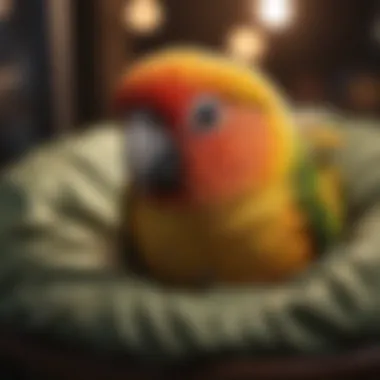
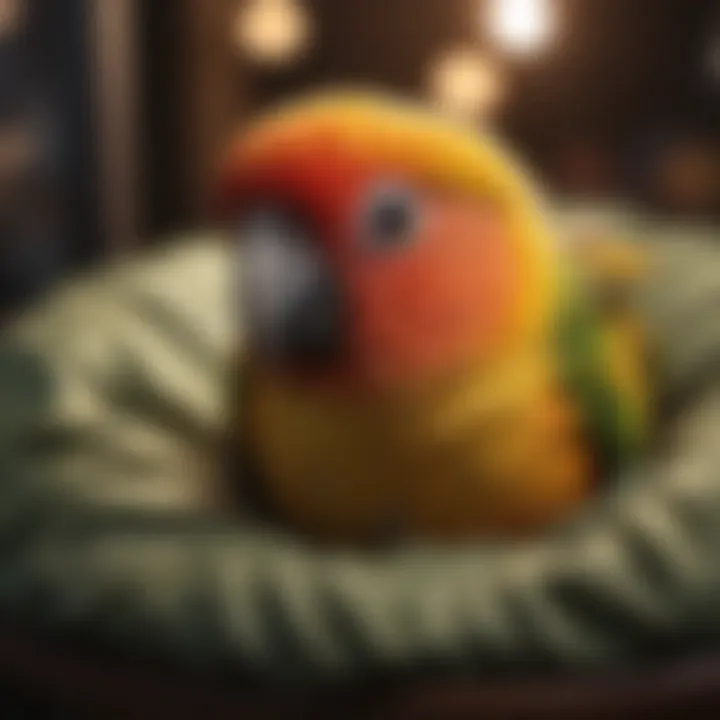
Intro
Creating a perfect sleeping environment for your conure goes beyond simply buying a cozy bed. It involves understanding their unique needs, preferences, and natural behaviors. Pet owners often underestimate how crucial a well-designed sleep space can be for their feathered friends. In this exploration, we delve into various aspects that contribute to a sound sleeping haven for your conure. From the material and design of the bed to how the layout impacts their comfort, every detail matters in ensuring your pet's overall well-being.
Avian Care Basics
Importance of Proper Nutrition
To lay a solid foundation for your conure’s health, proper nutrition is paramount. A well-balanced diet boosts their immune system and enhances their mood. Your conure’s meals should not only consist of seeds; they thrive on a mix of fresh fruits, vegetables, and high-quality pellets. Experiment with offerings such as kale, carrots, and berries. The vibrant colors of healthy food stimulate their interest and appetite.
Understanding Bird Species and Their Needs
Each bird species bears unique characteristics and requirements. Conures are particularly social and curious creatures, thus needing more interaction and mental stimulation compared to other pet birds. Understanding the nuances of their personality helps in tailoring care strategies. For example, a green-cheeked conure might be more playful, while a sun conure could lean towards loud vocalization.
Basics of Birds Habitat Setup
Establishing a suitable habitat is essential for your conure’s comfort. Proper housing should provide adequate space for movement and a perch for sleeping. The placement of the cage plays a role too; avoid direct sunlight while ensuring they can observe household activities. Furthermore, consider incorporating toys and climbing structures to encourage activity and keep boredom at bay.
Grooming and Hygiene Tips
Grooming isn't merely aesthetics; it’s vital for health. Regularly check your conure’s feathers for dirt or damage, and don’t forget about their beaks and nails. A gentle, routine bath can keep their feathers in optimal condition, just like a regular dental check for humans. Maintain hygiene around the sleeping area by periodically cleaning the cage and removing any leftover food.
Interacting with Your Pet Bird
Building Trust and Connection
One of the keys to a loving relationship with your conure lies in building trust. Always approach them calmly, allowing them to come to you at their own pace. Gradually offer treats or engage in gentle play to solidify that connection. Over time, your conure will feel safe in your presence, turning their trust into a strong bond.
Training Techniques and Tips
Training is not just about teaching tricks but about establishing a respectful relationship. Using positive reinforcement – think of treats or praises – can yield impressive results. Some owners find that clicker training works wonders, marking positive moments promptly allows the bird to connect with their behavior.
Fun Activities for Bird Owners and Their Birds
Conures are energetic and require activities that stimulate their minds. Simple games can involve hiding treats in toys or creating obstacle courses in safe environments. Enlightening their minds keeps them happy and engaged. Every bird is different; experiment to find what sparks joy in yours!
Recognizing Bird Cues and Behaviors
Understanding your conure’s body language plays a significant role in their happiness. Signs of contentment like feathers fluffed up or playfulness with toys indicate a happy bird. In contrast, unusual aggression or constant hiding can signify stress. Observing these cues ensures you cater to their emotional needs efficiently.
Emotional Well-Being of Birds
The Role of Play and Socialization
Social interaction is essential; conures thrive in companionship. Engaging them in regular playtime fosters emotional health. Create routines for socialization, allowing them to interact with you or others in the household. A busy conure is a happy one!
Enhancing Birds' Emotional Health
Consider placing mirrors in their domain, inspiring them to “socialize” with their reflection. Rotate toys regularly to offer variety, enticing them to explore new adventures and keep them emotionally stimulated. Investing effort in their emotional landscapes greatly contributes to their overall happiness.
Assessing Bird Stress and Remedies
Situational changes can bring stress to your feathered friend. Signs of stress may appear in different forms - excessive screeching or feather plucking could indicate discomfort. Creating a consistent environment and observing their habits can help alleviate these issues, leading to a more serene atmosphere.
Building Strong Human-Bird Bonds
The foundation of an effective bond involves respect and care. Spending quality time interacting, be it through talk or gentle play, strengthens ties. With patience and dedication, you can develop a profound connection with your bird, ensuring they feel safe and cherished.
Bird Health and Safety
Common Health Issues and Prevention
Be aware of frequent health problems like respiratory infections or feather disorders. Prevention is key; maintain cleanliness around your bird's space to minimize potential health risks. A close monitoring can help catch early signs of illness.
Routine Veterinary Care
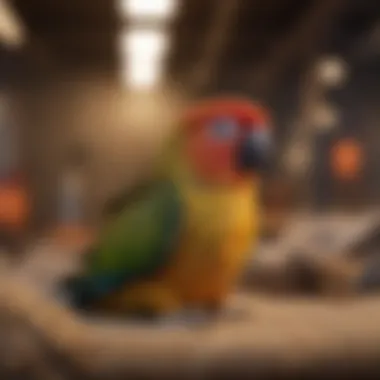
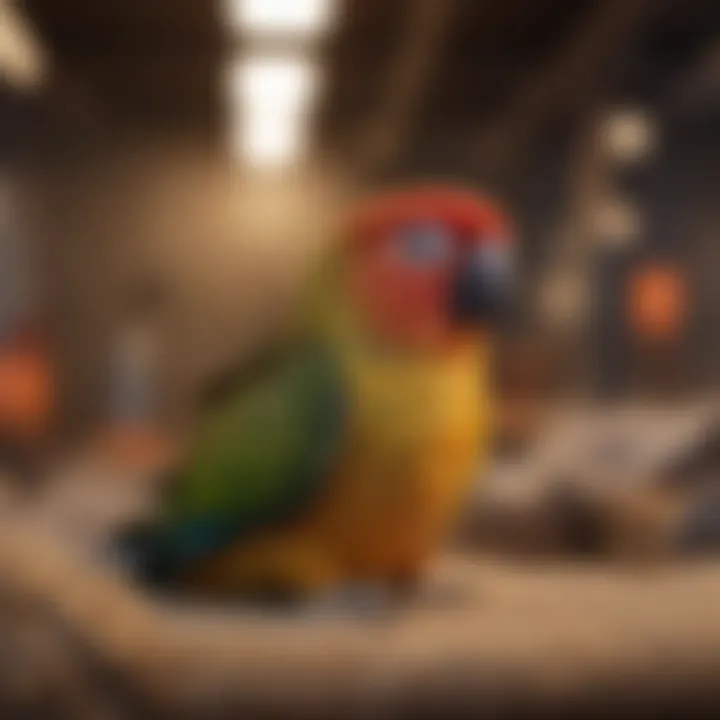
Regular veterinary check-ups are essential in maintaining your conure’s health. Experts recommend annual visits, but if your conure shows signs of distress, don’t hesitate to seek help. It’s better to err on the side of caution.
Environmental Hazards to Avoid
Keep a keen eye on surroundings; many household items can be harmful. Non-stick cookware, certain plants, and toxic foods should be kept out of reach to prevent accidental poisoning. Understanding potential dangers helps create a safe haven for your bird.
Signs of Illness or Distress
Early detection of illness can prolong your bird's life. Specific symptoms include lethargy, change in eating habits, or unusual vocalizations. Pay attention to these warnings; they’re your birds' way of signaling discomfort.
Fun Facts and Quirky Insights
Unique Traits of Popular Bird Species
Curiosity often finds its way into a bird's personality. Some species, like the African Grey parrots, are known for their remarkable cognitive abilities, while conures are adored for their playful antics. Each bird carries its unique charm that captivates pet owners.
Historical and Cultural Significance of Birds
Throughout history, birds have held powerful symbolism in various cultures, often representing freedom and inspiration. They’ve been depicted in art, literature, and even mythology, showcasing the profound impact they have on human imagination.
Famous Bird Owners and Their Stories
Birds have woven themselves into the lives of many famous personalities. From John Lennon’s love for his macaw to the vibrant history of parrots in the media, their narratives combine well with human stories, illustrating the bond transcending species.
Prelims to Conure Care
Caring for a conure goes beyond just providing food and water; it encompasses a myriad of factors that contribute to their overall health and happiness. Understanding these aspects is essential for any bird owner looking to foster a nurturing environment. When it comes to designing a suitable sleeping area for a conure, the foundational knowledge of conure care plays a pivotal role. It provides the background needed to make informed decisions regarding their wellbeing.
Conures, with their vibrant colors and spirited personalities, are not just pets; they're companions that deserve thoughtful consideration of their needs. Failing to create a proper sleep space can lead to issues like stress, which in turn can affect their health and behavior.
The benefits of rigorous conure care can be seen in the happiness and vitality of these birds. Elements such as regular interaction, proper nutrition, and of course, a suitable sleeping space, can significantly enhance their quality of life. Additionally, a well-planned sleep area contributes to better sleep patterns, which are essential for their physical and psychological health.
Understanding Conures
Conures are small to medium-sized parrots notable for their intelligence and social behavior. Ranging from the popular sun conure to the quieter green-cheeked conure, each variety possesses its unique characteristics. They are highly social creatures that thrive on interaction, both with their human caretakers and other birds. Forming a bond with your conure is vital as it leads to a sense of security and well-being, making them feel at home.
Different species may have varying preferences when it comes to sleeping environments. For example, a sun conure might favor a high perch, while a maroon-bellied conure might be drawn to cozy, enclosed areas. As such, understanding these traits allows you to tailor the perfect sleeping arrangement. The goal is to create an area where your conure feels safe, comfortable, and ready for restful sleep.
Why Sleep Matters for Conures
Sleep is as important for conures as it is for humans. A well-rested conure is a happy conure, while sleep deprivation can lead to a host of issues. Like many birds, conures are crepuscular, which means they are most active during dawn and dusk. Thus, they require a good night's sleep to recharge and maintain their liveliness during the day.
Some consequences of inadequate sleep include:
- Increased irritability and aggression
- Compromised immune function
- Potential vocalization issues that can escalate into excessive noise
- Difficulty in learning and engaging in new activities
"A well-rested conure is a lively companion; without adequate sleep, their vibrant spirit can dim."
To ensure a proper sleep cycle, it is crucial to establish an environment that promotes restful sleep. This consideration entails everything from the location of the sleeping space to the materials used. Creating a haven for your feathered friend encourages a sense of tranquility, which is fundamental for their overall health.
Understanding the significance of sleep in the life of a conure lays the groundwork for further discussions on how best to create an ideal sleeping space.
Key Considerations for a Conure Bed
Designing a proper sleeping area for your conure is more than just putting together some bedding in a corner of the cage. It requires careful thought and planning, as these little creatures have specific needs and preferences that must be considered to promote their health and happiness. Not only does a well-crafted sleep space encourage restful sleep, but it also contributes to the overall well-being of your feathered companion. Here’s a closer look at the critical elements that can make a remarkable difference in your conure's sleep experience.
Size and Space Requirements
When it comes to a conure bed, size matters—this isn't just about having enough room for them to nestle in. The bed should that fit comfortably within the cage, allowing your conure to feel cozy and secure without feeling cramped. Ideally, you want to measure the available space in the cage and consider your bird's size.
A good starting point is to have the bed be about one-third of your conure's wingspan, providing enough room to stretch and adjust into a comfortable sleeping position. This degree of spaciousness also allows for some movement, which is essential as conures are naturally active and curious.
To enhance the sleeping spot, avoid placing it too close to water dishes or food sources; that can complicate their sleep patterns. A quiet, dim corner of the cage is ideal. Just think about it: would you want someone clumsily walking into your sleeping area every five minutes?
Choosing the Right Materials
Selecting the materials for the conure bed is equally crucial. Your choice influences not just comfort but also hygiene and durability. Avoid synthetic materials, as they might cause discomfort or irritation to your bird’s sensitive feet. Instead, look for natural materials that mimic what they would encounter in their native South American forests.

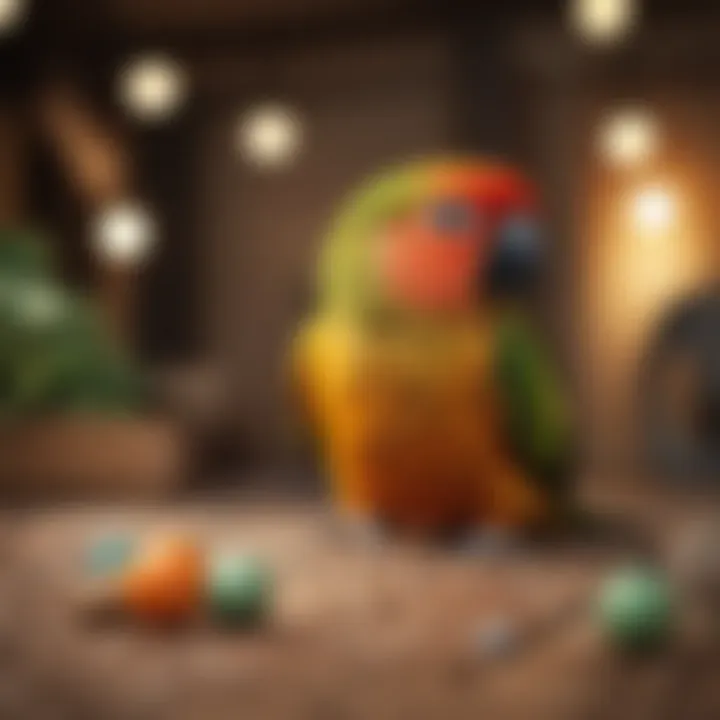
Some suitable options include:
- Cotton: Soft and breathable, easily washed and replaced when it gets dirty.
- Hemp: Strong and eco-friendly, offering a bit of texture without being abrasive.
- Wool: A natural insulator that can keep your conure warm during cooler nights.
Remember to avoid materials with harmful chemicals or pesticides. It might seem a hassle, but taking this extra step ensures your conure’s health remains uncompromised. It's better to be safe than sorry when it comes to our feathered friends.
Safety Features to Consider
Safety should always be at the forefront of your mind when designing any aspect of your pet's living environment. A conure bed should be void of sticking-out parts and sharp edges that may cause injury. Instead, opt for rounded corners and secure fittings.
Consider incorporating the following safety measures into your design:
- Non-Toxic Materials: Ensure everything in the sleep area is free from harmful substances.
- Sturdy Construction: Choose materials that will not collapse or bend easily under the weight of your bird.
- Avoid Small Parts: This includes anything that could be chewed off and swallowed, posing choking hazards.
"Safety is paramount; a relaxed bird is a happy bird."
Lastly, regularly inspect the bed's condition and replace any worn-out parts. A proactive approach to maintenance will keep your conure's sleep space secure and comfortable, allowing them to snuggle in without a care in the world.
Designing the Sleeping Area
Creating the right sleeping area for your conure is more than just a decorative choice; it’s a fundamental element of their well-being. A thoughtfully designed space can significantly improve your pet's sleep quality, leading to better health, mood, and overall behavior. Conures, being emotionally intelligent birds, respond well to their environments, and a cozy sleeping nook can reflect directly on their happiness.
Location within the Cage
When determining the optimal location for your conure's bed within their cage, you'll want to consider several factors. First and foremost, conures thrive on stability. Placing their sleeping area towards the back or top of the cage can create a sense of security, safeguarding them from perceived threats. Birds naturally choose elevated spots in the wild to sleep, as this provides a vantage point against predators.
- Avoid drafts: Ensure the bed is away from any gaps or openings where cold air might rush in, making the area uncomfortable for your bird.
- Noise reduction: Selecting a quieter zone can help promote undisturbed sleep. Keeping it away from areas of high activity will lessen stress during their downtime.
Creating a Cozy Environment
Next comes the creation of a cozy environment, which plays a critical role in encouraging your conure to snuggle down and feel secure. Their sense of comfort can be enhanced by the arrangement and aesthetics of the sleeping space.
Here are a few pointers:
- Soft bedding: Using materials like fleece or cotton can provide softness against their bodies, mimicking the feel of a natural bird nest.
- Covering options: Adding items like light fabric or curtain-like features creates a snug area, reducing visual stressors. You can consider temporary options that are easy to remove during the day.
- Personal touches: Incorporate toys or a favorite perch near the bed. These familiar scents and objects can help your conure feel at home, especially if they are transitioning to a new space.
Incorporating Natural Elements
Conures are, by nature, creatures of the wild, and their instincts can dictate what they find pleasing in their space. Bringing in natural elements can greatly enhance their surroundings, making them feel more connected to their instinctual roots.
- Natural materials: Using wood, coconut shells, or bamboo is not just aesthetically pleasing but also comforting for birds. These materials can also be safe and engaging for them to chew.
- Greenery: If possible, add safe plants or leaves that mimic their natural habitat. Make sure to research what’s safe; some plants can be harmful to birds.
- Bringing nature inside: Consider adding a small dish with sand or dirt at the bottom of their cage. This can allow them to engage in natural behaviors like digging and foraging.
Ultimately, the goal is to combine security, comfort, and nature to offer your conure a designated space that supports their mental and emotional health.
By thoughtfully designing the sleeping area, you set the groundwork for a restful night’s sleep, which can lead to a more vibrant and content bird by day.
Understanding Conure Sleep Patterns
Understanding the sleep patterns of conures is essential for creating a restful environment for these lively birds. Sleep significantly influences their health, mood, and behavior. Just as you or I require a peaceful night to recharge, so do our avian companions. Thus, when considering a conure bed, it becomes crucial to align the sleeping area with their natural instincts and requirements.
Natural Sleep Behaviors
Conures, like most birds, follow a specific sleep cycle that's closely linked to their natural habitat. In the wild, these birds generally sleep after sunset and wake at dawn. This schedule coincides with the natural light conditions of their environment. During sleep, conures may fluff up their feathers and sometimes even perch with one foot tucked under their bodies.
To promote a healthy sleep routine, establish a consistent bedtime that mirrors these natural behaviors. It's important to create a routine for your conure that signals the end of activity for the day. While they might revel in social interaction during the daytime, they prefer a quieter setting at night to help them wind down. You can find that a dimly lit area helps induce sleepiness.
Inadequate sleep or disturbances during these essential hours can lead to stress, which impacts their overall well-being and behavior. For instance, a tired conure might display aggression or excessive vocalization. So, fostering a proper sleeping environment is not just a nice extra; it’s a matter of health.
Impact of Lighting on Sleep
Lighting plays a pivotal role in the sleep patterns of conures. Bright lights can interfere with their natural sleep cycle, leading to disrupted sleep and increased anxiety. To mimic the natural gradual transition from day to night, consider utilizing dimmable lights or soft night lamps that can slowly decrease in brightness as nighttime approaches.
Experts suggest avoiding harsh fluorescent lights and keeping your conure's sleeping area away from direct glare to help them sleep better. Additionally, think about blackout curtains to prevent any outside distractions, such as streetlights or passing car headlights from disturbing their rest.
Just as importantly, exposure to natural sunlight during the day can boost your conure's mood. However, this needs to be balanced with the right amount of darkness at night. If you find your feathered friend is unusually agitated or tired during the day, it might be time to re-evaluate the light conditions in their sleeping area.
Ultimately, monitoring both their natural sleep behaviors and the environmental factors affecting their sleep will enhance their quality of life. By keeping these elements in mind, you're not just crafting a bed, you’re building a sanctuary where your conure can truly feel at home.
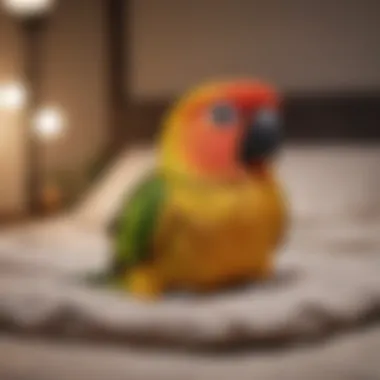
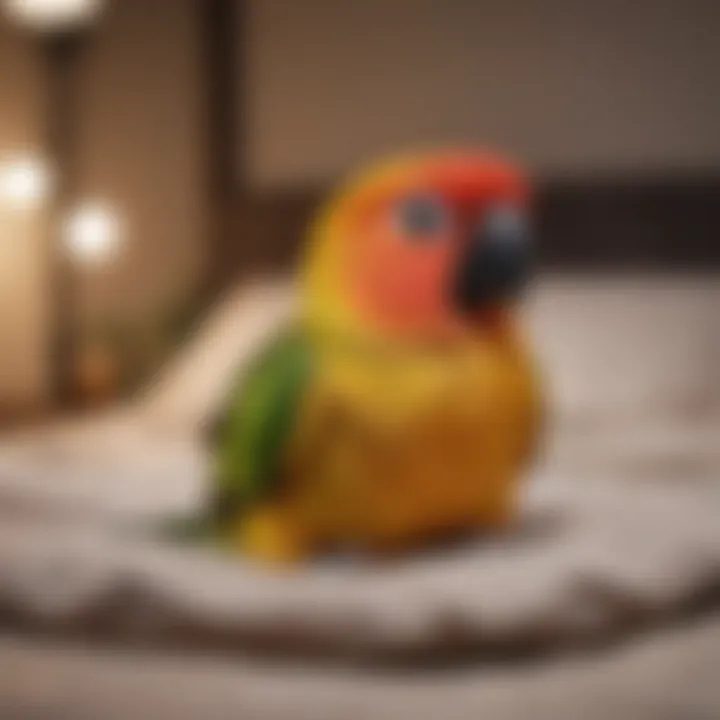
Choosing Appropriate Bedding
Selecting the right bedding for your conure is of paramount importance, as it directly influences their comfort and overall well-being. Unlike other pets, conures have specific needs that must be attended to in their sleep environment. Proper bedding can enhance not only their comfort for a good night's sleep but also their health. After all, these vibrant creatures deserve a cozy nook that mirrors the safety of their natural habitats.
Types of Bedding Materials
When it comes to bedding, choices abound. However, it’s crucial to remember that not all materials are suitable for your feathery companions. Below are several bedding materials often favored by conure owners:
- Paper-based bedding: An excellent option, easily available and affordable. This material is absorbent and lightweight, making it simple to clean out regularly.
- Coconut fiber bedding: This eco-friendly option provides some natural texture, allowing conures to burrow, which they may find comforting. It's also biodegradable, contributing to a more sustainable environment for those who are conscious about their footprint.
- Soft cloth or fleece: While it adds a layer of comfort, it's vital to ensure that it's washable and doesn’t pose a choking hazard.
- Aspen shavings: Although somewhat controversial, many bird owners swear by them. Choose fine shavings rather than large, coarse pieces to avoid any potential risks to your pet.
Be sure to steer clear of cedar and pine shavings, as they can emit harmful oils that are dangerous for birds. Moreover, depending on your conure's playfulness, various options may either suit or deter their urge to explore.
Tips for Transitioning to a New Bed
Transitioning your conure to a new bed can seem like a daunting task, but it’s an important step for ensuring your pet’s comfort and wellbeing. Conures, like many birds, thrive on routine, and sudden changes can leave them feeling unsettled. It's crucial to consider specific elements during this transition, as these can have a significant effect on your bird's sleep quality and overall health.
Moving from Old to New
When introducing a new bed to your conure's space, it’s essential to make the transition smooth. Start by placing the new bed near the old one. This placement allows your conure to see and explore the new option without the pressure of making an immediate choice. It’s kind of like offering a buffet where they can see what’s on the table before picking their favorites.
- Gradual Transition: Allow your conure to interact with the new bed while still having access to the old one. This gradual shift can minimize stress and has a better likelihood of acceptance.
- Familiarity is Key: Try to incorporate some elements from the old bed into the new one. A piece of the old bedding, for example, can make the new space feel less unfamiliar, easing the conure into using it. Birds have a keen sense of smell, and familiar scents can be comforting.
- Positive Reinforcement: Whenever your pet utilizes the new bed, reinforce this behavior with treats or verbal praise. Positive associations can encourage your conure to start choosing the new bed as their preferred spot.
Monitoring Behavior During Change
Once the new bed is in place and your conure starts seeking it out, paying attention to their behavior is vital. Monitoring their reactions during this transition can provide you with valuable insights into their comfort level and any adjustments that may need to be made.
- Watch for Signs of Comfort: Look for behaviors that indicate your conure is feeling secure in their new environment, such as preening, stretching, or snuggling down for a nap. A happy bird will often exhibit these relaxed behaviors, signaling that they feel safe in their sleeping area.
- Increased Vocalization: Sometimes, change can lead to increased chatter or noise. This can be a sign of anxiety, and is something to note. If your conure seems excessively vocal, it may be worth reassessing the bed’s placement or materials.
- Adjustments as Needed: If your conure doesn’t seem to adapt well, it’s okay to revert to the old bed temporarily while you figure things out. Each bird has unique needs, and finding the right balance may require some trial and error.
"Every bird is a unique individual, and so is every situation; patience is key when adjusting to new changes."
Ensuring a smooth transition when moving your conure to a new bed is largely about patience and careful observation. Taking the time to understand your bird’s preferences and comfort can lead to happier, healthier sleep habits for your feathered friend.
Common Mistakes to Avoid
Creating an optimal sleep environment for your conure is no small feat. Pet owners often aim to craft the ultimate cozy bed for their feathered friends, but there are some common pitfalls that can pop up along the way. Knowing these mistakes can save you time, money, and, most importantly, stress for your pet. Let's break down a couple of critical areas where conure owners often go wrong.
Overlooking Safety Measures
When it comes to your conure's sleeping space, safety should always be the top priority. Many pet owners might overlook this aspect in their enthusiasm to create a comfy bed. It sounds basic, but ensuring the materials used are safe is vital. Conures are naturally curious and can chew on anything within their reach. Some fabrics or fillers, like polyester or untreated wood, can be hazardous, so opting for bird-safe alternatives cannot be emphasized enough.
- Sharp edges or protrusions in the sleeping area can lead to injuries. Always inspect the structure to ensure it’s smooth and rounded.
- Chemical exposure is another concern. Freshly painted or varnished surfaces might look attractive but could release harmful fumes. Use materials that are non-toxic and untreated.
- Hiding places and escape routes should be considered in the cage design. Conures love to explore, and they could potentially get stuck. Ensuring that all parts of the bed structure are secure yet accessible is a fine balance.
At the end of the day, scrupulous checks on your conure’s bed ensure they’re safe and sound. As the saying goes, "An ounce of prevention is worth a pound of cure."
Choosing Incompatible Materials
Another prevalent mistake involves using materials that do not suit the unique needs of conures. Sometimes, owners might think that any plush fabric will do, but that's not always the case. Pay attention to the specific requirements your pet has for a comfortable sleep.
- Non-breathable fabrics can trap heat and moisture, causing discomfort. This can affect their sleep patterns and overall health. Look for materials that allow airflow.
- Heavy-weight bedding might seem inviting, but conures can feel suffocated under thick layers. A lightweight fabric that offers warmth without excess bulk is ideal.
- Detergents and cleaning agents used on bedding can also pose a threat. Strong chemicals can irritate your bird's respiratory system. Consider unscented, biodegradable laundry detergents when washing their bedding.
By being mindful of the materials used, you lay a strong foundation for your conure's comfort and health. The right choice of bedding can make all the difference in fostering a tranquil sleep atmosphere for your pet.
Closure: Prioritizing Your Conure's Sleep
Ensuring that your conure gets adequate sleep isn't just about their comfort; it's about overall health and happiness. Conures are lively little creatures that thrive on routine, and proper sleep is essential for their well-being. This article highlights numerous elements that contribute to crafting the perfect sleeping environment, from bedding options to placement within the cage, and every consideration in between.
Recap of Key Elements for a Conure Bed
To create an optimal sleeping area for your conure, remember to consider the following key aspects:
- Size and Space Requirements: Make sure the sleeping area is spacious enough for your bird to stretch out comfortably.
- Selection of Materials: Choose bedding materials that are natural, non-toxic, and breathable to keep your pet safe and cozy.
- Safety Features: Implement safety measures like sturdy construction to prevent any risks of injury while your conure sleeps.
- Location within the Cage: Position the sleeping area away from direct drafts and potential disturbances from daily activities.
- Hygiene Maintenance: Regular cleaning of the bedding is important for preventing unwanted odors and ensuring a hygienic space.
These elements combine to form a nurturing sleep environment that promotes well-rested and healthy conures.
Final Thoughts on Conure Wellbeing
In the booming realm of pet ownership, recognizing the necessity of your conure's sleep is vital. A well-rested bird behaves better and is less prone to stress and health issues. Just as you wouldn’t skimp on your own bed, the same applies to your feathered companion’s sleep space. Always be on the lookout for signs of discomfort or stress during sleep hours—changes in behavior can speak volumes.
Ultimately, prioritizing your conure’s sleep translates into higher degrees of happiness for both you and your pet. The little adjustments to their sleeping arrangements can greatly enhance their quality of life. So, invest time and effort into this aspect, and you will likely find yourself rewarded with a vibrant, content, and lively conure.
"A good night's sleep is a good night's care. Keep your conure's bed in check, and they'll take good care of your heart."
Sleep well, and let your conure fly high with joy!















